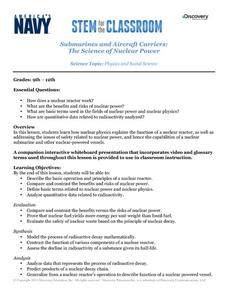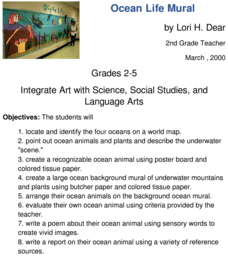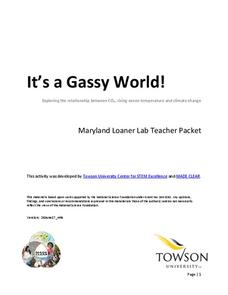Curated OER
I, Robot, Can Do That!
Students describe the three types of underwater robots and the advantages and disadvantages of using them. In this underwater lesson students are given a task and identify the best robot for the job.
Curated OER
Early Explorers
Fifth graders investigate the routes taken by the early explorers. For this explorers lesson, 5th graders use interactive notebooks, discussion and maps to discover the routes taken. Students get into pairs and label maps, and create...
Curated OER
Christopher Columbus
Students read about the good and bad aspects of Christopher Columbus in Jean Fritz's book, "Where do you think you're going, Christopher Columbus?" They conduct and analyze a survey about common myths and create a pop-up book.
Curated OER
Encountering Very Different Ways of Life
Students explore the concept of crossing cultures. They examine how Americans may be viewed by people in another culture and discover that that Peace Corps Volunteers are trained to cross cultures respectfully so that they are accepted...
Curated OER
This Dynamic Earth: The Story of Plate Tectonics
Discuss Earth's tectonic plates at middle school level with an informative presentation. Packed with maps, satellite images, diagrams, and photographs, the slideshow connects with any curriculum focused on plate tectonics. It...
Scholastic
Study Jams! Invertebrates
Stringed instruments play as viewers explore ocean invertebrates through nine nicely flowing slides. The captions describe the eight phyla: cnidaria, flatworms, roundworms, segmented worms, mollusks, arthropods,and enchinoderms. During...
Consortium for Ocean Science Exploration and Engagement (COSEE)
Plankton to Penguins: Antarctic Food Web
A well-written lesson plan, second in a series of four, gets high schoolers exploring how the Antarctic food web is impacted by climate change and the associated melting of polar ice sheets. It begins with a PowerPoint presentation about...
Discovery Education
Submarines and Aircraft Carriers: The Science of Nuclear Power
As physics masters view this presentation, they learn how nuclear power is used in submarines. They use Google Maps to plot a course through the ocean and calculate the time required for surfacing and traveling. They learn about fission,...
NOAA
What's the Difference?
Due to the isolation of seamounts, their biodiversity offers a great deal of information on the development of biological and physical processes. Pupils use simple cluster analysis to rate the similarity and differences in biological...
Curated OER
Ocean Life Mural
How many oceans can you name? First, have learners try to name as many oceans as they can, and then have them locate and identify the oceans on a world map. They create a recognizable ocean animal using poster board and tissue paper....
NOAA
A Matter of Density
Larvae transportation on the New England seamounts is based on the density of the water. Scholars calculate density and graph salinity versus temperature to better understand the distribution of organisms in a water column....
Curated OER
Plate Tectonics: Fifth Grade Lesson Plans and Activities
Fifth graders continue their investigation of the plate tectonics cycle with an exploration of the movement of Earth's crust. During the lab, young geologists conduct an experiment to discover the result of different types of...
Towson University
It's a Gassy World!
How much does your class know about the relationship between climate change and carbon dioxide? Science scholars explore the nature of greenhouse gases and rising ocean temperature through demonstrations, research, and experiments. The...
NOAA
It's a Roughy Life
Scientists recently discovered several previously unknown species at the Bear Seamount off the coast of New England. Scholars research these new species — benthopelagic, benthic, and seamount fish — and find out what makes them...
Curated OER
Goldfish Addition and Subtraction
Engage in a hands-on addition and subtraction activity that is a wonderful tie-in with ocean studies. As the teacher, you will make up equations using construction paper and goldfish crackers.
NOAA
Invertebrates
Crabs and lobsters ... yum! The 18th installment of a 23-part NOAA Enrichment in Marine sciences and Oceanography (NEMO) program focuses on invertebrate marine life. After the lecture slideshow, learners conduct an activity to sample...
Curated OER
Sand Travels
Students examine how sand is formed by erosion and that it can be moved by streams, rivers, and ocean currents in this unit of lessons. They study waves and currents, and structures that change how sand moves by creating story charts,...
Curated OER
Coral Bleaching in the Caribbean
Students practice analyzing images, maps and graphs from Internet-based educational resources. They explore the correlation between sea surface temperature and coral bleaching. Students comprehend that coral reefs are collections of tiny...
Curated OER
Plate Tectonics: Sixth Grade Lesson Plans and Activities
Here is a set of pre-lab, lab, and post-lab lesson plans on plate tectonics. After completing the previous labs on volcanoes and earthquakes, sixth graders use the gained knowledge to explore plate boundaries and the movement of...
NOAA
Vertebrates I
I spy a spine. The 19th installment of a 23-part NOAA Enrichment in Marine sciences and Oceanography (NEMO) program explores vertebrate species, such as sharks and other fish. Learners take part in an activity evaluating the...
NOAA
Biological Oceanographic Investigations – Signals from the Deep
The Deepwater Horizon oil spill directly impacted an area of the Gulf of Mexico the size of Oklahoma. A marine biology lesson looks at the impact of an oil spill on the deeper parts of the ocean. Scholars download actual data collected...
Curated OER
Plate Tectonics: Second Grade Lesson Plans and Activities
Second graders explore convection currents and how they relate to the movement of tectonic plates. Then, young geologists reconstruct Pangaea with a worksheet and pinpoint plate boundaries on a map...
Curated OER
Conductivity - Pass the Buoy and Pepper, Please
Buoys around our coastlines are equipped with sensory devices which monitor temperature, salinity, and water pressure. Emerging earth scientists examine some of this data and relate salinity to the electrical conductivity of the surface...
California Academy of Science
Banishing Bycatch
Bycatch is a sad reality for many sea turtles, dolphins, and sharks; it occurs when they get unintentionally caught in commercial fishing nets. The class plays a game using popcorn and crackers, each child will attempt to catch the...
Other popular searches
- Ocean Exploration Tools
- Pacific Ocean Exploration
- Ocean Exploration Food Web
- Ocean Exploration Technology
- Bill Nye Ocean Exploration
- Ocean Exploration Time Lines
- Human Ocean Exploration
- Ocean Exploration Time Lime
- Bill Nye: Ocean Exploration
- Ocean Exploration Expeditions
- Ocean Exploration Timelime

























